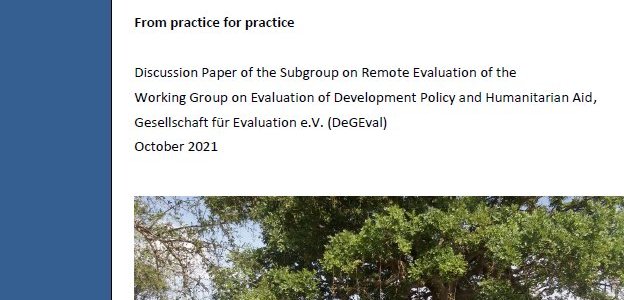QuIP Casebook – Attributing Development Impact
The qualitative impact protocol case book The Qualitative Impact Protocol (QuIP) is a methodology developed at the Centre for Development Studies, University of Bath in response to a DFID research call to better address the ‘attribution problem’ so often encountered when evaluating development interventions. The approach aims to find out directly from intended beneficiaries, service… Read More QuIP Casebook – Attributing Development Impact
Some thoughts on Learning from Evaluations
Speaking evidence to power Reporting evaluation results and communicating them effectively to policymakers and program managers is critical for improving uptake at the policy level and programming. By following the recommendations outlined in this article, evaluators can safeguard that their evaluation results are clear, concise, and actionable, and that they are communicated in a way… Read More Some thoughts on Learning from Evaluations
Remote Management, Monitoring & Verification #RMMV4Dev – KfW offers Tools and Community
KfW Development Bank has been working for some years on co-creating together with our colleagues and partners a set of Remote Management, Monitoring & Verification (RMMV) approaches, tools, and practical instructions for the International Financial Cooperation. These recommendations based on our collective experience have been recently published in the KfW RMMV Remote Management, Monitoring, and… Read More Remote Management, Monitoring & Verification #RMMV4Dev – KfW offers Tools and Community
Evaluating Sustainable Pathways to Climate Resilience, FAO meeting 29 March
Recent experiences from evaluations of IFAD, FAO, and GEF 29 March from 15:00 to 16:00h Rome time Link for registration: https://fao.zoom.us/j/99112180215 The session will explore emerging experience from recent evaluations in terms of methods, guidance, and tools to help evaluators assess the climate change related aspects of interventions in food systems, focusing on recent evaluation… Read More Evaluating Sustainable Pathways to Climate Resilience, FAO meeting 29 March
Impact Evaluation – A MAP OF USES
How to choose the appropriate approach? The Impact Evaluation “Map of Uses” designed by Agence Française de Développement’s evaluation unit, Quadrant Conseil and Strategic Design Scenario is to help evaluation officers understand the nature of evaluation needs and propose possible solutions. This impact evaluation map of uses has been produced for evaluation officers, to help them understand the nature of evaluation… Read More Impact Evaluation – A MAP OF USES
Experience capitalisation: Learning by doing
One of the major benefits of an experience capitalisation process is that it involves all those who are -or were- part of the experience. As in a systematisation process, this approach is believed to help identify specific innovations and practices, and -above all- to understand the reasons behind their successes or failures. Wageningen University made… Read More Experience capitalisation: Learning by doing
The future of impact evaluation – CEDIL conference concludes
CEDIL (Centre of Excellence for Development Impact and Learning https://cedilprogramme.org) was established in 2017 with UK aid funding from the UK government. CEDIL develops and tests innovative approaches to impact evaluation and evidence synthesis in low-income countries. The CEDIL Conference 2023 gathered some key players in impact evaluation as speakers and session Chairs: Annie Duflo, Arianna… Read More The future of impact evaluation – CEDIL conference concludes
DeGEval Guidelines for Remote Evaluation
Guidelines for Remote Evaluation – From practice for practiceDiscussion Paper of the Subgroup on Remote Evaluation of theWorking Group on Evaluation of Development Policy and Humanitarian Aid,Gesellschaft für Evaluation e.V. (DeGEval)October 2021 Remote_Evaluation_ENG_AK_Epol_HuHi_DeGEval_02_2022.pdf Since the COVID-19 pandemic in 2020, remote evaluations have been part of everyday practice in the evaluation of development cooperation and humanitarian… Read More DeGEval Guidelines for Remote Evaluation
Formative Evaluation of the integration by UNDP of the Principles of “Leaving No One Behind” – UNDP IEO
The commitment to ‘Leave No One Behind’ (LNOB) is a central transformative promise of the 2030 Agenda for Sustainable Development and one of three organizational ‘directions of change’ for UNDP. This formative evaluation report sets out the extent to which the LNOB principles of equality, equity and non-discrimination permeate key areas of UNDP programmes and… Read More Formative Evaluation of the integration by UNDP of the Principles of “Leaving No One Behind” – UNDP IEO


You must be logged in to post a comment.